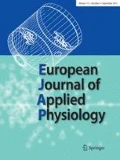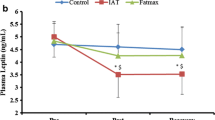Abstract
The purpose of this study was to investigate the effects of a submaximal aerobic exercise bout on adiponectin and resistin levels as well as insulin sensitivity, until 48 h post-exercise in healthy overweight males. Nine subjects performed an exercise bout at an intensity corresponding to approximately 65% of their maximal oxygen consumption for 45 min. Adiponectin, resistin, cortisol, insulin, glucose and insulin sensitivity were measured prior to exercise, immediately after exercise as well as 24 and 48 h after exercise. Data were analyzed using repeated measures ANOVA while Pearson’s correlations were performed to identify possible relationship among the assessed variables. There were no significant differences for adiponectin (μg ml−1) [pre, 3.61(0.73); post, 3.15(0.43); 24 h, 3.15(0.81); 48 h, 3.37(0.76)] or resistin (ng ml−1) [pre, 0.19(0.03); post, 0.13(0.03); 24 h, 0.23(0.04); 48 h, 0.23(0.03)] across time. Insulin sensitivity increased and insulin concentration decreased significantly only immediately after exercise. Furthermore, no significant correlations were observed among the variables assessed except for the expected between insulin level and insulin sensitivity. These results indicate that a submaximal aerobic workout does not result in significant changes in adiponectin and resistin up to 48 h post-exercise. Furthermore, it appears that adiponectin or resistin is not associated with insulin sensitivity.


Similar content being viewed by others
References
Adeghate E (2004) An update on the biology and physiology of resistin. Cell Mol Life Sci 61(19–20):2485–2496
Borghouts LB, Keizer HA (2000) Exercise and insulin sensitivity: a review. Int J Sports Med 21:1–12
Dill DB, Costill DL (1974) Calculation of percentage changes in volumes of blood, plasma, and red cells in dehydration. J Appl Physiol 37:247–248
Esposito K, Pontillo A, Di Palo C, Giugliano G, Masella M, Marfella R, Giugliano D (2003) Effect of weight loss and lifestyle changes on vascular inflammatory markers in obese women: a randomized trial. JAMA 289(14):1799–804
Ferguson MA, White LJ, McCoy S, Kim HW, Petty T, Wilsey J (2004) Plasma adiponectin response to acute exercise in healthy subjects. Eur J Appl Physiol 91(2–3):324–329
Fujinami A, Obayashi H, Ohta K, Ichimura T, Nishimura M, Matsui H, Kawahara Y, Yamazaki M, Ogata M, Hasegawa G, Nakamura N, Yoshikawa T, Nakano K, Ohta M (2004) Enzyme-linked immunosorbent assay for circulating human resistin: resistin concentration in normal subjects and patients with type 2 diabetes. Clin Chim Acta 339:57–63
Giannopoulou I, Fernhall B, Carhart R, Weinstock RS, Baynard T, Figueroa A, Kanaley JA (2005) Effects of diet and/or exercise on the adipocytokine and inflammatory cytokine levels of postmenopausal women with type 2 diabetes. Metabolism 54:866–875
Hara T, Fujiwara H, Nakao H, Mimura T, Yoshikawa T, Fujimoto S (2005) Body composition is related to increase in plasma adiponectin levels rather than training in young obese men. Eur J Appl Physiol 94(5–6):520–526
Henriksen EJ (2002) Invited review: effects of acute exercise and exercise training on insulin resistance. J Appl Physiol. 93(2):788–796
Hotta K, Funahashi T, Arita Y, Takahashi M, Matsuda M, Okamoto Y, Iwahashi H, Kuriyama H, Ouchi N, Maeda K, Nishida M, Kihara S, Sakai N, Nakajima T, Hasegawa K, Muraguchi M, Ohmoto Y, Nakamura T, Yamashita S, Hanafusa T, Matsuzawa Y (2000) Plasma concentration of a novel, adipose specific protein, adiponectin, in type 2 d, adipose-specific protein, adiponectin, in type 2 diabetic patients. Arterioscler Thromb Vasc Biol 20:1595–1599
Hulver MW, Zheng D, Tanner CJ, Houmard JA, Kraus WE, Slentz CA, Sinha MK, Pories WJ, MacDonald KG, Dohm GL (2002) Adiponectin is not altered with exercise training despite enhanced insulin action. Am J Physiol Endocrinol Metab 283(4):E861–E865
Jurimae J, Purge P, Jurimae T (2005) Adiponectin is altered after maximal exercise in highly trained male rowers. Eur J Appl Physiol 93(4):502–505
Kraemer RR, Aboudehen KS, Carruth AK, Durand RT, Acevedo EO, Hebert EP, Johnson LG, Castracane VD (2003) Adiponectin responses to continuous and progressively intense intermittent exercise. Med Sci Sports Exerc 35(8):1320–1325
Kriketos AD, Gan SK, Poynten AM, Furler SM, Chisholm DJ, Campbell LV (2004) Exercise increases adiponectin levels and insulin sensitivity in humans. Diabetes Care 27(2):629–630
Lee JH, Chan JL, Yiannakouris N, Kontogianni M, Estrada E, Seip R, Orlova C, Mantzoros CS (2003) Circulating resistin levels are not associated with obesity or insulin resistance in humans and are not regulated by fasting or leptin administration: cross-sectional and interventional studies in normal, insulin resistant, and diabetic subjects. J Clin Endocrinol Metab 88:4848–4856
Maeda N, Takahashi M, Funahashi T, Kihara S, Nishizawa H, Kishida K, Nagaretani H, Matsuda M, Komuro R, Ouchi N, Kuriyama H, Hotta K, Nakamura T, Shimomura I, Matsuzawa Y (2001) PPAR-gamma ligants increase expression and plasma concentrations of adiponectin, an adipose-derived protein. Diabetes 50:2094–2099
Marcell TJ, McAuley KA, Traustadottir T, Reaven PD (2005) Exercise training is not associated with improved levels of C-reactive protein or adiponectin. Metabolism 54(4):533–541
Matthews DR, Hosker JP, Rudenski AS, Naylor BA, Treacher DF, Turner RC (1985) Homeostasis model assessment: insulin resistance and beta-cell function from fasting plasma glucose and insulin concentrations in man. Diabetologia 28(7):412–419
Monzillo LU, Hamdy O, Horton ES, Ledbury S, Mullooly C, Jarema C, Porter S, Ovalle K, Moussa A, Mantzoros CS (2003) Effect of lifestyle modification on adipokine levels in obese subjects with insulin resistance. Obes Res 11:1048–1054
Punyadeera C, Zorenc AH, Koopman R, McAinch AJ, Smit E, Manders R, Keizer HA, Cameron-Smith D, van Loon LJ (2005) The effects of exercise and adipose tissue lipolysis on plasma adiponectin concentration and adiponectin receptor expression in human skeletal muscle. Eur J Endocrinol 152(3):427–436
Ryan AS, Nicklas BJ, Berman DM, Elahi D (2003) Adiponectin levels do not change with moderate dietary induced weight loss and exercise in obese postmenopausal women. Int J Obes Relat Metab Disord 27(9):1066–1071
Steppan CM, Bailey ST, Bhat S, Brown EJ, Banerjee RR, Wright CM, Patel HR, Ahima RS, Lazar MA (2001) The hormone resistin links obesity to diabetes. Nature 409(6818):307–312
Weyer C, Funahashi T, Tanaka S, Hotta K, Matsuzawa Y, Pratley RE, Tataranni PA (2001) Hypoadiponectinemia in obesity and type 2 diabetes: close association with insulin resistance and hyperinsulinemia. J Clin Endocrinol Metab 86:1930–1935
Wolf G (2004) Insulin resistance and obesity: resistin, a hormone secreted by adipose tissue. Nutr Rev 62 (10):389–394
Yamauchi T, Kamon J, Waki H, Terauchi Y, Kubota N, Hara K, Mori Y, Ide T, Murakami K, Tsuboyama-Kasaoka N, Ezaki O, Akanuma Y, Gavrilova O, Vinson C, Reitman ML, Kagechika H, Shudo K, Yoda M, Nakano Y, Tobe K, Nagai R, Kimura S, Tomita M, Froguel P, Kadowaki T (2001) The fat-derived hormone adiponectin reverses insulin resistance associated with both lipoatrophy and obesity. Nat Med 7:941–946
Yang WS, Lee WJ, Funahashi T, Tanaka S, Matsuzawa Y, Chao CL, Chen CL, Tai TY, Chuang LM (2001) Weight reduction increase plasma levels of an adipose-derived anti-inflammatory protein, adiponectin. J Clin Endocrinol Metab 86:3815–3819
Acknowledgement
This work was supported by a grant from the Gatorade Sports Science Institute.
Author information
Authors and Affiliations
Corresponding author
Rights and permissions
About this article
Cite this article
Jamurtas, A.Z., Theocharis, V., Koukoulis, G. et al. The effects of acute exercise on serum adiponectin and resistin levels and their relation to insulin sensitivity in overweight males. Eur J Appl Physiol 97, 122–126 (2006). https://doi.org/10.1007/s00421-006-0169-x
Accepted:
Published:
Issue Date:
DOI: https://doi.org/10.1007/s00421-006-0169-x




